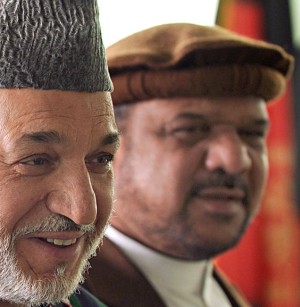The real winner of Afghanistan’s election
T he real winner of Afghanistan’s presidential election will not be Hamid Karzai or his main rival, Abdullah Abdullah. It’s a man named Mohammad Qasim Fahim. He is Afghanistan’s senior-most military commander, with the lifetime rank of marshal, and was Karzai’s running mate during the campaign. Whether Karzai or one of his opponents wins, Fahim will hold and exercise extraordinary influence over the country’s military and security apparatus — more so than the elected president.
he real winner of Afghanistan’s presidential election will not be Hamid Karzai or his main rival, Abdullah Abdullah. It’s a man named Mohammad Qasim Fahim. He is Afghanistan’s senior-most military commander, with the lifetime rank of marshal, and was Karzai’s running mate during the campaign. Whether Karzai or one of his opponents wins, Fahim will hold and exercise extraordinary influence over the country’s military and security apparatus — more so than the elected president.
This means the real loser of Afghanistan’s presidential election — besides the Afghan people — will be the United States’ long-standing ambition to train and equip enough Afghan forces to allow for an eventual withdrawal of the U.S. military. Building up the Afghan military and police is at the heart of Gen. Stanley McChrystal’s latest assessment for Washington of what needs to be done in Afghanistan. But McChrystal’s forces will be training Afghan soldiers and police to work for Fahim: a human-rights-abusing, drug-trafficking warlord who might also have had a role in al Qaeda’s assassination of his political godfather, Tajik warlord Ahmad Shah Massoud, on Sept. 9, 2001 — an operation widely viewed in retrospect as a precursor to the terrorist attacks in the United States two days later. [continued…]
Time to get out of Afghanistan
“Yesterday,” reads the e-mail from Allen, a Marine in Afghanistan, “I gave blood because a Marine, while out on patrol, stepped on a [mine’s] pressure plate and lost both legs.” Then “another Marine with a bullet wound to the head was brought in. Both Marines died this morning.”
“I’m sorry about the drama,” writes Allen, an enthusiastic infantryman willing to die “so that each of you may grow old.” He says: “I put everything in God’s hands.” And: “Semper Fi!”
Allen and others of America’s finest are also in Washington’s hands. This city should keep faith with them by rapidly reversing the trajectory of America’s involvement in Afghanistan, where, says the Dutch commander of coalition forces in a southern province, walking through the region is “like walking through the Old Testament.” [continued…]
It is deja vu on a huge and bloody scale. General Stanley McChrystal, the US commander in Afghanistan, is about to advise his president that “the Afghan people are undergoing a crisis of confidence because the war against the Taliban has not made their lives better”, according to leaked reports. Change the word “Taliban” to “mujahideen”, and you have an exact repetition of what the Russians found a quarter of a century ago.
Like Nato today, the Kremlin realised its forces had little control outside the main cities. The parallels don’t end there. The Russians called their Afghan enemies dukhy (ghosts), ever-present but invisible, as hidden in death as they were when alive – which echoes Sean Smith’s recent photographic account of the fighting in Helmand and the failure of the British units he was with to find a single Talib body.
The Soviet authorities never invited western reporters to be embedded, but you could track down Afghan war veterans in Moscow’s gloomier housing estates. They were conscripts, unlike British and US troops, so perhaps they had a heightened sense of anger. But how many British vets would share the sentiments that Igor expressed, as he hung out with his mates one evening in February 1989 and let me listen? “You remember that mother who lost her son. She kept repeating, ‘He fulfilled his duty. He fulfilled his duty to the end.’ That’s the most tragic thing. What duty? I suppose that’s what saves her, her notion of duty. She hasn’t yet realised it was all a ridiculous mistake. I’m putting it mildly. If she opened her eyes to our whole Afghan thing, she’d probably find it hard to hold out.” [continued…]

